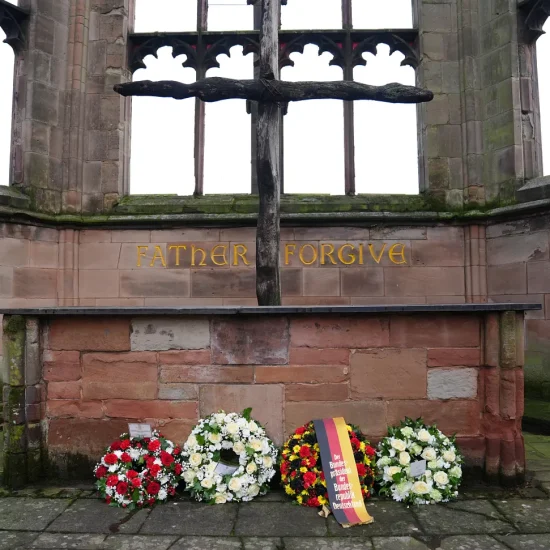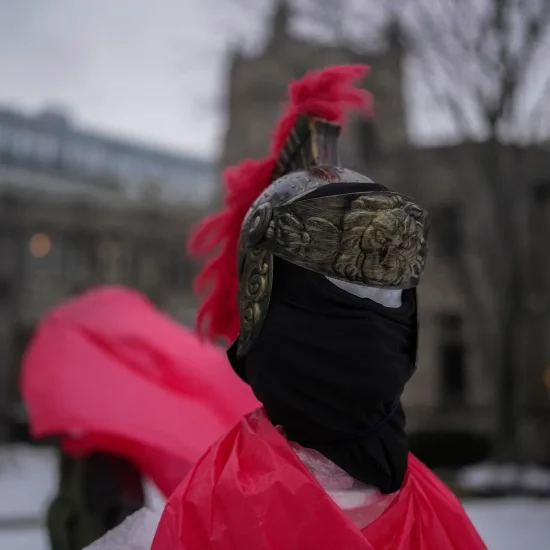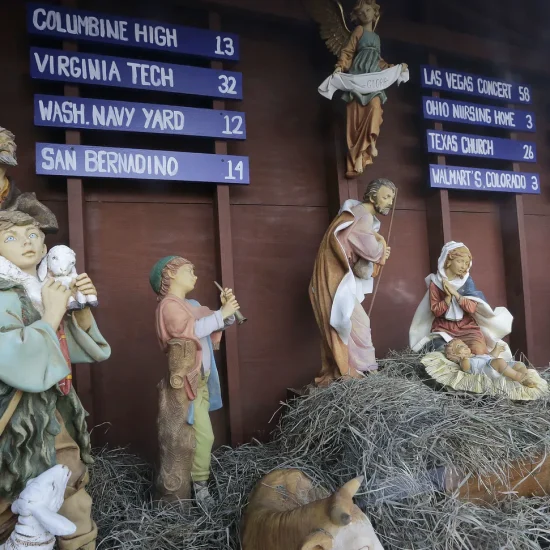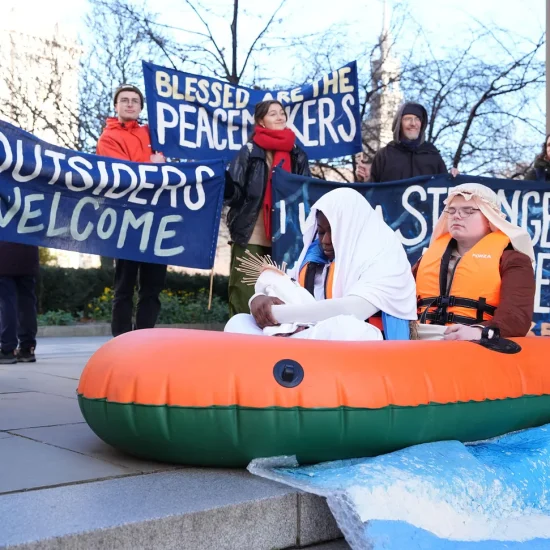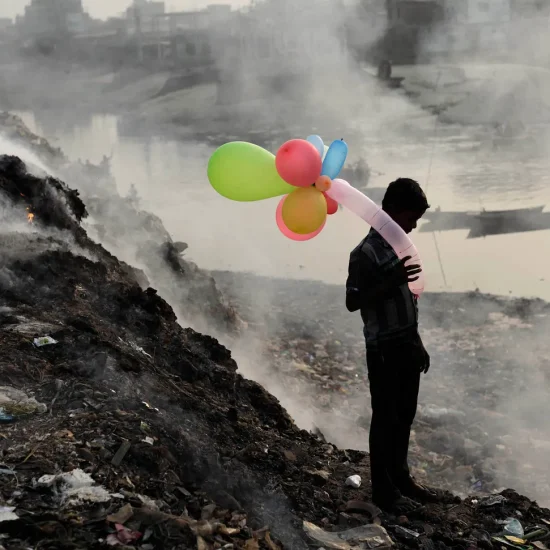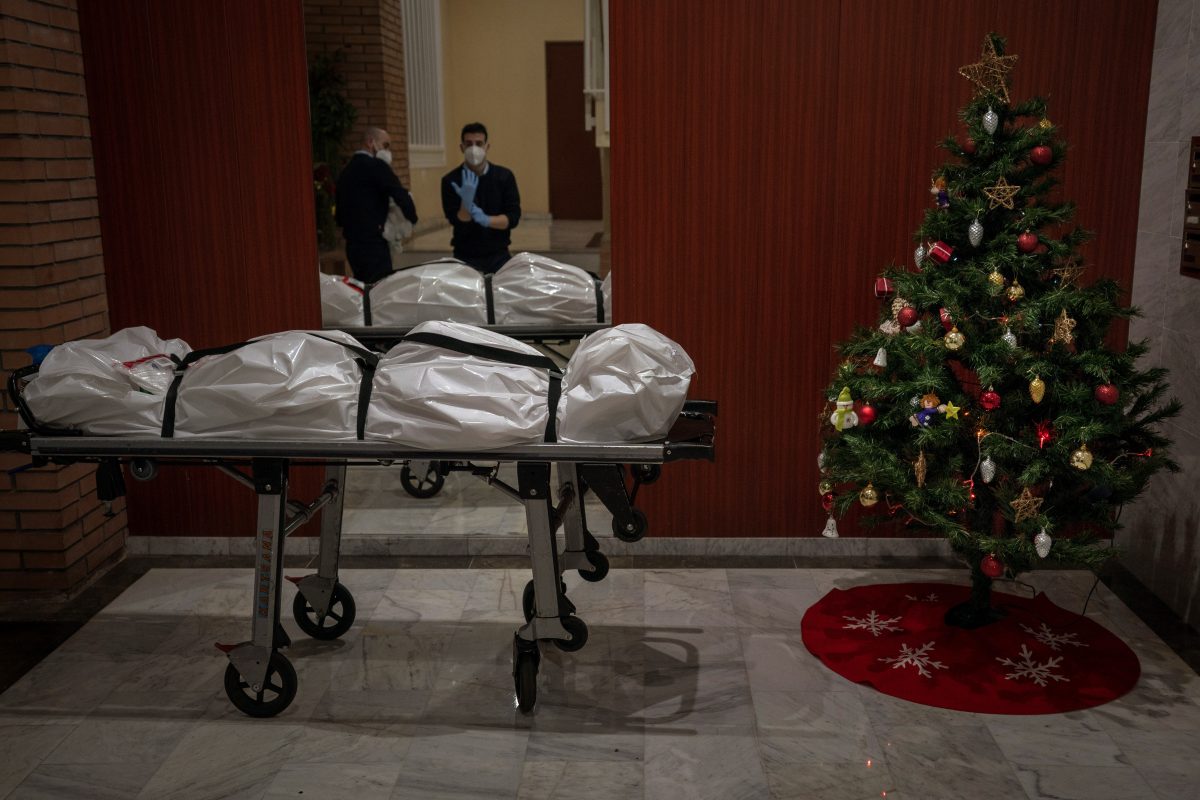
If you find yourself in Christchurch, England, this holiday season, you could experience a living Advent calendar. For the first 24 nights in December, a different musician, artist, or theatrical group will offer an impromptu performance at various locations around the city. This offers a unique twist on a tradition of counting down to Christmas that dates back to the 19th century.
Many other creative ways exist to mark this time. For just $20.35, you can buy Friends: The Official Advent Calendar, which “is filled with fun Friends surprises and will encourage you to celebrate the holidays with friends along with Ross, Rachel, Monica, Chandler, Joey, and Phoebe.” If “how you doin’?” doesn’t put you into the festive spirit, consider the Godiva Chocolate calendar, the Harry Potter Calendar Cube (with 24 gifts, including a snow globe!), or the LEGO version featuring buildable characters from The Mandalorian (which, considering the biblical Herod story, gives new meaning to “you know this is no place for a child.”)
What none of these clever offerings will do is draw you closer to God during this time of waiting and anticipation. Rants about how consumerism corrupts Advent and Christmas are a staple of Christian reflection and preaching this time of year. We agree with those sentiments, but that’s not our frustration here. Rather, our concern is with the loss of historical memory. Our ritual observances of Advent, utilizing whatever calendar you choose, fail to bridge the distance between then and now.
In reality, many of the social ills facing us today — disease, oppression, violence — were present at the time of Jesus’s birth. As the theologian Drew G.I. Hart put it, “Jesus’s coming as the messiah of God should be understood in response to the troubles of this world. The enduring night of violence and oppression are not inconsequential to Jesus’s presence among us. Jesus was born into the chaos of violence and oppression, but the Way of Jesus invites disciples to enter, in contrast, into a gracious and life-giving path of deliverance out of these devastating cycles.”
That’s why we’re inviting you to join us in “Unsettling Advent” this year. We’ll be offering a daily devotional starting on Nov. 28 that seeks to connect the problems in our present with the realities of when Jesus arrived in this world. This is not a safe set of reflections that warms your heart by the fire like the Keurig variety pack Advent calendar. Rather, we’ll be challenging readers to engage this period of waiting in a different way because our current circumstances oddly offer echoes of the first Advent.
 So, sign up now if you want to receive these free daily reflections by email.
So, sign up now if you want to receive these free daily reflections by email.
Meanwhile, we’ll use this edition of A Public Witness to set the stage for Advent and countdown ways in which the pandemic, oppression, and insurrection defining our contemporary moment are strikingly similar to when Jesus was first born so long ago. This is not only an Advent in unsettling times but a time when we need to unsettle how we too often think of Advent.
Advent in a Pandemic (Again)
The coming of the Christ child is not the only thing we’re waiting on this year. As we experience a second pandemic Advent and Christmas, we are almost as eager for COVID-19 to leave as we are for Jesus to arrive. While many churches will return to more normal routines this year relative to last winter, new spikes of the virus are a reminder of the threat it poses.
The Incarnation is miraculous, in part, because God freely chooses to experience human vulnerability. Jesus enters the world as a baby and faces all the challenges it has to offer. God comes to be with us amid the constant threat of death that looms over our existence.
With this pandemic claiming the lives of more than 5 million of God’s children globally and north of 750,000 in the United States, Jesus joins us in a time of great fear, suffering, and tragedy. Lamentably, his followers continue to be part of the problem.

Mortuary workers take off their protective clothing at the entrance of a building decorated with a Christmas tree, after removing the body of person who died of COVID-19 in Barcelona, Spain, on Dec. 23, 2020. (Emilio Morenatti/Associated Press)
Given our pandemic fatigue, it would be easy to use Advent as an escape. Here is a time for spiritual discipline that calls us away from the world and the virus rampaging through it. We want to set our hearts solely on things above. Yet, that would be a mistake because God is coming near.
Consider what biblical scholar Dale Allison wrote in his book Night Comes: Death, Imagination, and the Last Things: “If one goes through the published Jewish epitaphs from 300 BCE to 700 CE and averages the ages of death, the result is 28.4. That pathetic number, moreover, must be higher than historical reality. For one thing, we have more epitaphs for men than women, and then, unlike today, men tended to live longer. For another, most infants and many younger children were buried without markers, and the infant and child mortality rates were atrocious.”
Considering we’re both past the 28 years and five months mark (by only a couple months, of course), we’re suddenly feeling a bit old. But in a strange way, the reality of Advent in a pandemic draws us closer to the times of Jesus. Death surrounded people even more in that time before modern medicine as people regularly died from infections from minor cuts or unseen viruses (though the anti-vaxxers might help us relive those days). That’s the setting God enters into.
“Infectious diseases were probably the prime cause of death in antiquity,” explained Rosemary Margaret Luff, an archaeologist and emeritus fellow at Clare Hall, University of Cambridge. “Endemic infectious disease coupled with poor understanding of hygiene affected all classes.”
Similarly, COVID over the last two years helped stripped away our feelings of invincibility for those of us willing to pay attention and not take drugs intended for the animals in our live nativities. This holiday season will be the first for many people after the loss of loved ones over the past 11 months. The twinkling lights and festive songs might sound off-key in this time of lament.
During Advent, we are waiting for God to join us in a time dominated by death (and, of course, God has something to say about that).
Advent Amid Continued Oppression
Our country continues to struggle with its original sin of racism. Instead of honestly dealing with these demons, a new culture war is raging over whether the history of systemic racism belongs in our public education curriculums.
Churches are not immune from these forces. Debates about Critical Race Theory (a term whose meaning is expanding beyond its original niche within academic legal scholarship) are dividing churches and denominations. These manufactured controversies distract from the real work of pursuing racial justice, frustrating pastors eager to address such a clear example of sin.
“A lot of places in society will make you eat it for lunch if you confess to racism,” Sean Palmer, a Black pastor in Houston, Texas, told a gathering of former evangelicals last month. “Church is the place you can confess and find forgiveness.”
Advent would seem the perfect season to acknowledge racism’s reality, within our own hearts and across our society, as we prepare to encounter God in Jesus Christ. Especially because Jesus was a dark-skinned Jew from Galilee rather than the White Christ so often depicted in art hanging in our churches. That imagery matters because the Swedish Jesus picture whitewashes the racially oppressive context in which Jesus was born.
“As a Jew, Jesus was an ethnic minority in the Roman Empire,” Christena Cleveland, then a professor at Duke University’s Divinity School, explained in Christianity Today. “Throughout his life, he knew the pain of being a member of an ethnic group whose culture, religion, and experiences were marginalized by those in power.
“As an ethnic minority, Jesus didn’t simply care about people who were victims of Rome-sanctioned violence, he was a victim of Rome-sanctioned violence,” she added. “To Jesus, ministry meant knowing from the inside the pain of society’s most marginalized.”

Stained-glass window of a Black Jesus in 16th Street Baptist Church in Birmingham, Alabama, which was installed after the 1963 bombing of the church by KKK members that killed four young Black girls. (Brian Kaylor/Word&Way)
Seeing a dark-skinned Jesus not only impacts how we view his ministry and teachings but also the way we look at our own society.
“Racism as a system of prejudice backed up with power is how White Americans have accrued economic privilege, and sustained that privilege through divisive politics. Ironically enough, many White Americans fail to see that this racist political privilege mostly delivers economic benefits to the actual ‘powerful on their thrones’ and facilitates an economic strangle-hold on everybody else,” wrote Christian pastor and theologian Susan Brooks Thistlethwaite. “This whole system is challenged by the birth of Jesus of Nazareth, the incarnation of the justice and peace of God.”
Rather than turning away from the oppression of Black, Brown, and other bodies within our society, we should use this time of awaiting Jesus’s own physical presence to focus on ways that unjust and inequitable practices and structures continue to deny the inherent equality of every person created in the Image of God.
Advent After Insurrection
The events of Jan. 6 may seem long ago, but new details continue to emerge about efforts by then-President Donald Trump and his team to overturn the results of a free and fair election. While the images of that day made clear the immediate threat facing our democracy, the actual peril we survived is still coming to light.
This is the first Advent since that insurrection. If the basic affirmation of the Christian faith is “Jesus is Lord,” then the task of Christian discipleship is preparing ourselves to resist all the other Caesars out there that demand our ultimate loyalty. The presence of so many Christian signs and symbols at The Capitol on that infamous day made clear that many supposed believers are failing this fundamental test.
There is worship being directed to the wrong places. A confidence in salvation coming from powers and principalities instead of God’s suffering servant. In the scandal of such idolatry, Advent contains the possibility of provoking our repentance and transforming our ways.

Christian symbols carried by insurrectionists storming the U.S. Capitol on Jan. 6, 2021. (Lev Radin/Pacific Press/Shutterstock)
Again, this test is not that dissimilar to the circumstances surrounding Jesus’s birth or the context of the earliest Christians. Back then, competing ideas of power and ultimate meaning existed. As biblical scholars Marcus Borg and John Dominic Crossan wrote in The First Christmas, “The fundamental difference between those divergent visions of earth’s final kingdom is not about ends, but about means. The imperial kingdom of Rome — and this may indeed apply to any other empire as well — had as its program peace through victory. The eschatological kingdom of God has as its program peace through justice.”
Humans are always susceptible to the propensity of turning themselves into gods, of seeing their ways as the righteous cause. Such delusional vanities lead to the justification of extreme ideas, such as unconstitutional calls for delaying the certification of the election results or even declaring martial law. These are paths to “peace” through victory, but they are far from just.
The connections to Jesus’s time grow even starker when you account for the events of his childhood, which take place in the shadow of Herod the Great’s passing and insurrections against Roman rule occurring throughout Israel. As Shane Claiborne and Chris Haw noted in Jesus for President, the time around Jesus’s birth was “an age filled with popular unrest, suppression, and protests, movements, and riots.” The insurrections, which especially occurred in the region of Galilee, often led to Romans wiping out entire towns and crucifying thousands of people in a single day. That wasn’t a good time for Middle East tourism. These revolutions surely impacted Jesus and those around him.
Thus, Borg and Crossan wrote, “The major event in [Jesus’s] village’s life was the day the Romans came. As he grew up toward Luke’s coming-of-age at twelve, he could not not have heard, again and again and again, about the day of the Romans — who had escaped and who had not, who had lived and who had died.”
The first Advent was a time defined by insurrection and the Empire’s response. While the invasion by Rome and the Capitol attack are drastically different events, a sense of societal upheaval and uncertainty is common to both.
An Unsettled Advent
Advent should feel different every year. The beauty of ritual is its power to root us in tradition amid changing circumstances. We do the same thing to reorient ourselves to the altered world around us. In this unsettled season of pandemics, oppression, and insurrection, Advent should also feel unsettled — or else we risk offering little more than a sappy, festive Lifetime movie.
We must wait in the usual ways for God to do a new thing but also recognize our anticipation arises in an unusual time. As Stephanie Paulsell of Harvard Divinity School put it, “We are called to wake up but also to watch. Watching is an active, layered kind of wakefulness, a way of waiting and seeking at once. We are to watch what is inside of us and outside of us, to watch the signs of the times and to extend our watching beyond our time toward the day when swords are beaten into plowshares, the poor satisfied, and the powerless strengthened, the day when all peoples gather at the Lord’s banquet and all tears are wiped away.”
So, we watch. We take in what is going on around us and we remember God’s promises to us. We prepare the confession of our sins and the profession of our faith in the One who was, is, and forever will be. Claiming that faith and experiencing the arrival of Emmanuel, God with us, changes who we are and how we respond to God’s gracious and humble entrance.
Again, Paulsell described it well: “Advent calls us to prepare a way within us and in the world around us to receive the Christ-child. We remember him as a baby born in a stable because his laboring mother was turned away from safe shelter. We remember him as a refugee whose parents crossed the border into Egypt to protect him from violence. To prepare a way for Jesus is to create safe places for him to live, to protect him from the violence that threatens him.”

(Greyson Joralemon/Unsplash)
So, we invite you to join us and about twenty other writers as we think about what it means to prepare a way in unsettling times like this. (We’re not going to send you the devotionals unless you sign up for this special series since we recognize that not everyone on our current email list will want the daily messages.)
Each daily devotional in the free Unsettling Advent series will help us with this meaningfully journey of considering an Advent in unusual times. Starting Nov. 28 and running through Christmas Eve, we will ponder together the lessons of God coming 2,000 years ago and God working in our context today of a pandemic, continuing racial oppression, and the aftermath of an insurrection.
Yet, even in the darkness, the angelic messenger arrives to declare, “In the town of David a Savior has been born to you.” And the world the Romans thought they had settled, shifted under their feet. Amen.
As a public witness,
Brian Kaylor & Beau Underwood
Sign up today for the free Unsettling Advent daily devotional emails!

